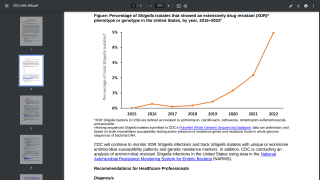Cabo Verde Visitors Depart with an Unwanted Bacteria

An outbreak of shigellosis cases among travelers returning from the Republic of Cabo Verde has been reported by the European Centre for Disease Prevention and Control (ECDC).
As of February 17, 2023, the ECDC's report confirmed 10 EU/EEA countries, the U.K., and the U.S. confirmed 221 Shigella infections and 37 possible cases, who had visited Cabo Verde, which is located off the west coast of Spain.
Based on the available information, many cases are reported to have stayed in all-inclusive hotels located in the region of Santa Maria on the southern island of Sal.
The most recent cases were reported in Sweden on January 19, 2023, suggesting an ongoing moderate risk of new infections among travelers to Cabo Verde.
The ECDC indicated the initial case was from early November 2022, when the Netherlands reported an 'event' about an unusual increase of patients with Shigella sonnei infection and with a travel history to Cabo Verde.
Shigellosis is a gastrointestinal infection caused by one of four species of Shigella bacteria.
Possible symptoms and complications depend on the species of the bacteria causing the infection.
Shigellosis is caught by swallowing material contaminated by feces, either via the hands or on objects in contact with feces. Infection can also be caught from contaminated food and water.
And children under the age of five, food handlers, and healthcare staff should stay at home for 48 hours after their symptoms have ceased.
The U.S. CDC travel advisory issued in November 2022 suggested various travel vaccinations before visiting.
And recently, the CDC estimated the occurrence of over 440,000 annual shigellosis cases in the U.S., approximately 80% of which are caused by Shigella sonnei.
And according to the U.S. FDA, there is no approved vaccine targeting shigellosis as of 2020.
To help clarify this health issue, the FDA posted an updated FAQ in February 2023.
Note: The information in this ECDC factsheet is intended for general information and should not be used as a substitute for healthcare professionals' guidance, expertise, and judgment.
Our Trust Standards: Medical Advisory Committee




